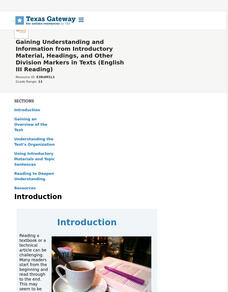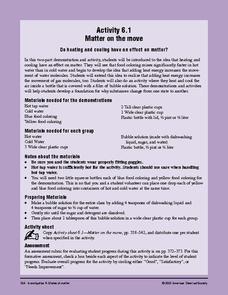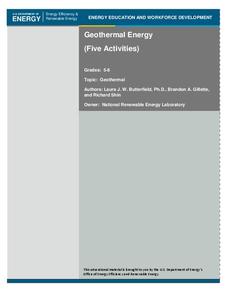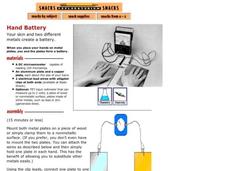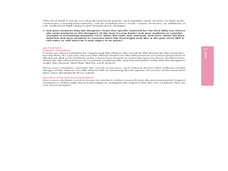Texas Education Agency (TEA)
Gaining Understanding and Information from Introductory Material, Headings, and Other Division Markers in Texts (English III Reading)
All teachers are teachers of reading! The 13-part interactive series ends with a lesson that teaches learners (and their instructors) how to approach reading their textbooks. After learning about several strategies, users test their...
EngageNY
Conducting Research: Analyzing a Variety of Sources to Capture Information about My Insect
From picture to words. Scholars analyze a picture of an ant and then list two facts they observed and any questions that may arise. Expert groups from the previous instructional activity then look at a diagram about either an ant or...
MENSA Education & Research Foundation
The Cell: the Building Blocks of Life
Do you have early finishers asking what they can do next, or any budding scientists eager to learn more about plant and animal cells? Then here is a cell unit for you! The packet provides scholars with everything they need in order to...
Education Outside
Rooftop Garden: Soils Experiment
Young scientists conduct a series of experiments to determine what type of soils produce the best results in roof-top gardens.
Virginia Department of Education
Atomic Structure: Elements
It's all relevant, really. Individuals use the scientific method to learn more about elements, atoms, and their placement on the periodic table. They conduct experiments using materials common in nature to explore how elements affect our...
Museum of Tolerance
The Pursuit of Democracy and Diversity: The Trial of Pro-Social Injustice in Historical Documents and Accounts
Class members investigate The Indian Removal Act of 1830, U.S. Theft of Mexican Territory Timeline, and President Abraham Lincoln’s letter to Horace Greeley, 1862, and then conduct a mock trial of each of these documents to determine...
Virginia Department of Education
Metals, Nonmetals, and Metalloids
How can one easily classify metals, nonmetals, and metalloids? Pupils answer this question as they experiment with unknown substances and perform tests on conductivity, brittleness, and malleability to determine which unknown belongs in...
Consumers Energy
Conductors and Insulators
Why did the orchestra director use a copper baton? She heard it makes a great conductor. Scholars select six items to test in a circuit to determine if each is a conductor or an insulator. Clear instructions for using electricity allow...
Curated OER
Conductivity Lessons
"Conduct" some simple experiments with these great lesson plans on conductors and insulators!
Curated OER
Life During the Great Depression An Oral History Project
Although our connections to those who personally witnessed the Holocaust are dwindling, this lesson focuses on conducting an interview and getting some primary source material. There is a list of resources your high schoolers can...
EngageNY
Bean Counting
Why do I have to do bean counting if I'm not going to become an accountant? The 24th installment of a 35-part module has the class conducting experiments using beans to collect data. Learners use exponential functions to model this...
Library of Congress
The Conservation Movement at a Crossroads: The Hetch Hetchy Controversy
Should wilderness areas be preserved or managed? Class members examine primary source documents, including lecture notes, articles, essays and congressional records to better understand the Hetch Hetchy controversy that created a split...
American Chemical Society
Matter on the Move
Start this mini unit on matter out by demonstrating how food coloring behaves when placed in cold and in hot water. Then have the class experiment with warm water and soap film. Pupils will learn that an increase in thermal energy also...
US Department of Energy
Geothermal Energy
With Earth Day quickly approaching, as well as many science fairs, why not challenge your class to investigate geothermal energy or other renewable energy resources? There are five driving questions explored in depth here, as well as...
Exploratorium
Hand Battery
Get hands-on in your physical science class by having learners conduct electricity with their own hands! By placing one hand on each of two different metals, a current can be generated and measured on a microammeter. Make an experiement...
Constitutional Rights Foundation
If Men Were Angels: Teaching the Constitution With the Federalist Papers
Much like the methods of group work, the writers of the Federalist Papers worked together to advocate for their viewpoints against the anti-federalists. The resource enables learners to break into small groups and conduct research before...
American Chemical Society
Recrystallization Test
Crystallize the answer to the question that has been investigated since the first of four lessons: What is the unknown crystal? Pupils have examined, crushed, and dissolved four samples plus an unknown as an exploration of the properties...
Washington State Department of Health
Let's Cook!
Recipes, tasting activities, images of fruits and veggies, fun food facts... you name it, this resource has it! Your class will be cooking up wonderful dishes in no time with these materials. Included here are recipes, handouts,...
Baylor College
Greenhouse S'Mores
Your class will agree that this is the best way to demonstrate the greenhouse effect: making solar s'mores! Using a clear plastic cups as mini atmospheres, lab groups compare how adding different materials affects the melting rate of...
Close Up Foundation
Rights Auction
In an engaging activity on universal and unalienable rights, learners work in groups to establish a democratic nation and determine what principles they want to protect to ensure a democratic society. They conduct a "rights auction" in...
Rice University
College Physics for AP® Courses
Take a look at an organized physics course. The 34-section electronic textbook covers material in AP® Physics 1 and 2. Teachers use the text to supplement lectures and have the class work through the labs. Each section contains multiple...
WindWise Education
Are Birds Impacted by Small Wind Turbines?
How do we know if the wind turbine at our school is impacting birds? Here, small groups work together and conduct field work in order to determine the impact of a human-made structure on birds. The groups also determine their searcher...
Curated OER
How is heat transferred through conduction?
Fifth graders observe different types of conductors. They answer orally about the conduction of heat energy with 100% accuracy. Students investigate some materials that conduct heat much better than others, and poor conductors can...
Curated OER
Materials and Process: Plastics
Young scholars investigate the development of plastics in the twentieth century. For this plastics lesson, students complete image based discussion activities for the pictures and methods of polymers. Young scholars create an object...


